110 videos match your search.
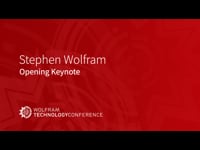 |
Join Stephen Wolfram to kick off the start of the conference. |
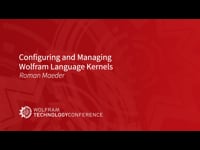 |
Roman Maeder Using the Wolfram Language, it is possible to connect to other Wolfram Language engines (kernels) both locally and on remote computers. Kernels can be used for ad-hoc evaluations, as session kernels of a notebook or bundled for parallel computation. Support for discovering, configuring and managing kernel resources is now available across a wide variety of environments. We will discuss local ... |
 |
Paul Abbott The 3-4 week Wolfram Summer School Educational Innovation track provides hands-on Wolfram Language training, extensive high-quality mentoring from experts and Wolfram Research developers sharing their experience in making educational technologies and quality feedback from other like-minded educators. In this presentation I will give an overview of the Wolfram Summer School ... |
 |
Roman Maeder Iterators are a generalization of lists that are accessed one element at a time. Iterators allow us to work with data whose length is infinite or unknown, and they avoid the explicit generation of all elements at the same time, by using incremental generators. First presented a year ago, this project has now matured, and I would like to share some of the improvements made, focusing on programming techniques for paclet design, seamless integration of iterators into ... |
 |
Mads Bahrami, Nikolay Murzin |
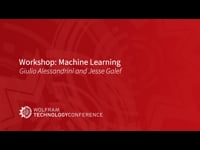 |
Giulio Alessandrini, Jesse Galef |
 |
Jose Martin-Garcia |
 |
Jose Martin-Garcia |
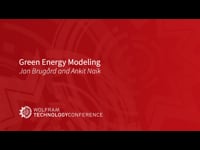 |
Ankit Naik, Jan Brugard Investigate novel concepts for power production, understand energy markets and balance the grid using Wolfram System Modeler. In this presentation, we will use a simplified model of Sweden's power system ... |
 |
Jeremy Stratton-Smith, Jordan Hasler, Anne Marie-Torresen, Enrique Zeleny Vazquez, Nicholas Brunk We discuss the 140+ resource functions that the Wolfram|Alpha Math Content team has published. These build upon and sometimes run in parallel to kernel functions, and often are aligned to ... |
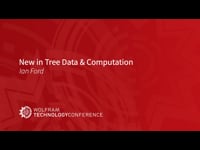 |
Ian Ford Tree is a new fundamental construct in the Wolfram Language added in Version 12.3 used to represent rooted, ordered, labeled trees. In this talk, we will present a variety of new ... |
 |
Niko Erä-Esko When developing a new aircraft, there are many different subcontractors involved for designing and manufacturing different components of the aircraft.
But how is each part tested before all the ... |
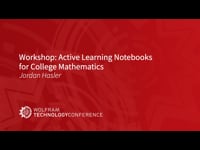 |
Jordan Hasler Modern learning spaces combine computation, visualization and concept exploration. Wolfram|Alpha Notebook Edition facilitates all three, teaching Wolfram Language along the way. This talk demonstrates the breadth and depth of ... |
 |
Rohan Mehta The Marvel Cinematic Universe has expanded to include several shows on the Disney+ streaming platform, allowing Marvel to experiment with different styles. Ms. Marvel in particular has received a range of opinions, with some claiming that it has been review-bombed. To examine this claim, I used the tools ... |
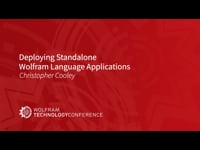 |
Christopher Cooley Have you ever wanted to share your Wolfram Language code with colleagues or sell your code to the public? The Wolfram standalone applications project is working on making it easy ... |
 |
Riccardo Di Virgilio The ExternalEvaluate framework lets you evaluate code from a number of external languages and environments such as Python, Ruby and Java directly in your Wolfram session. This talk will focus ... |
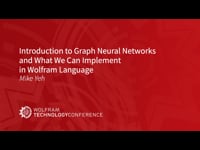 |
Mike Yeh I will give a quick review of the ideas of graph neural networks (GNN), then overview the potential types of GNN and show more details of algorithms that can be ... |
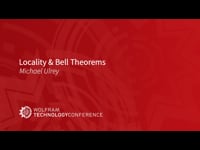 |
Michael L Ulrey It is often said that Bell's theorem demonstrates the impossibility of "local realism" as a basis for explaining quantum mechanics. In this talk, we attempt to separate the hype from the actual mathematics. How do wild statements about the nonlocality of the universe enter the picture? The goal is to identify ... |
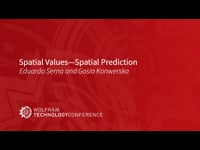 |
Eduardo Serna, Gosia Konwerska Spatial datasets consisting of a set of measured values at specific locations are becoming increasingly important. Examples include temperature, elevation, concentration of minerals, etc. We will look at existing Wolfram ... |
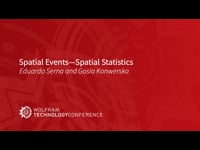 |
Eduardo Serna, Gosia Konwerska Spatial point patterns are collections of randomly positioned events in space. Examples include trees in a forest, positions of stars, earthquakes, crime locations, animal sightings, etc.
Spatial point data analysis, ... |